
Top Healthcare Operations Management Firms to Work With - February 2026
Introduction
Over the past year, clinical operations improvement has taken center stage as healthcare systems face mounting pressures to optimize care delivery and control costs. In this article, we’ll explore why selecting the right healthcare operations management firm in February 2026 is more critical than ever.
While many organizations are expanding internal teams, healthcare operations management firms remain essential due to their specialized expertise, ability to overcome bandwidth limitations, and value from a cost-efficiency standpoint. Ahead, we reveal the top 10 healthcare operations management firms leading the way in performance, innovation, and operational impact.
Top 10 Healthcare Operations Management Firms
1. G & Co.
G & Co. is a global strategy and experience partner helping healthcare organizations achieve operational excellence through tailored solutions that improve healthcare operations management, clinical operations performance, and healthcare operational efficiency across enterprise health systems.
G & Co. is known for helping healthcare leaders improve operational efficiencies in healthcare by combining strategic consulting with digital innovation—from redesigning patient journeys to optimizing back-office workflows. Its expertise spans clinical operations and healthcare management, and its clients include some of the most recognizable enterprise health systems seeking end-to-end transformation in healthcare operations.
G & Co. is a minority business enterprise (MBE), as certified by the National Minority Supplier Development Council (NMSDC). If diversity inclusion is a part of your supplier process, contact us—we may be a great fit for your enterprise.

2. Spikewell
Spikewell leverages AI to help health systems achieve operational excellence in healthcare by reducing inefficiencies across service delivery and resource allocation.
Specializing in healthcare operations management, Spikewell works with regional hospitals and academic centers to improve healthcare operational efficiency using predictive analytics and machine learning, helping clients better manage care coordination, staffing, and throughput.
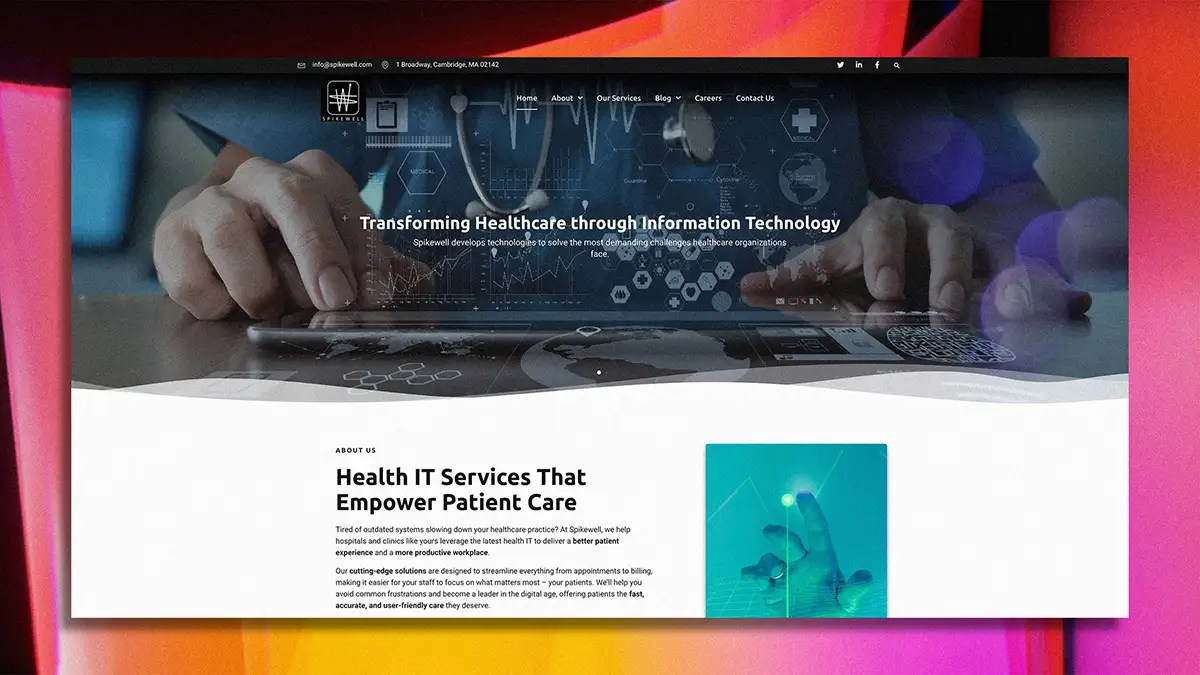
3. Tebra
Tebra provides an all-in-one healthcare operations platform that empowers providers to improve operational efficiencies in healthcare through scheduling, billing, and digital patient engagement.
Supporting over 150,000 providers, Tebra streamlines clinical operations and healthcare management with tools designed to help small and mid-sized practices boost efficiency, reduce no-shows, and enhance care delivery.
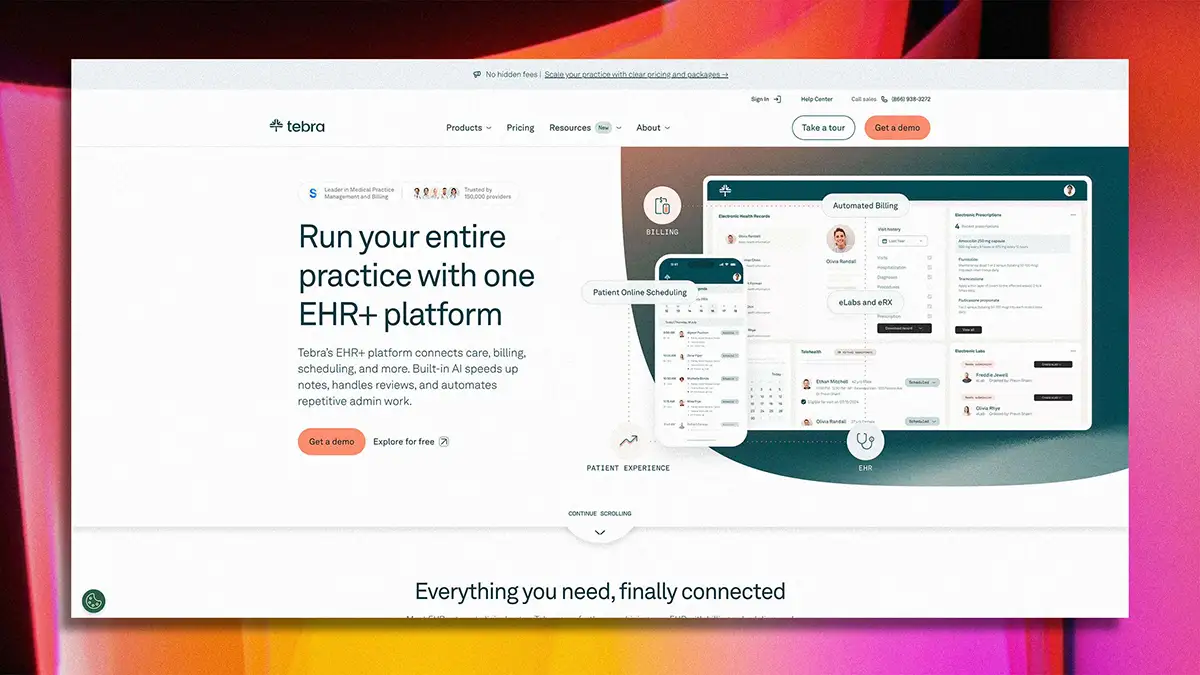
4. Qventus
Qventus uses real-time AI and automation to optimize operations management in healthcare and support large health systems in driving measurable healthcare operational improvement. Working with providers like HonorHealth, Qventus focuses on improving clinical operations through better patient flow, perioperative scheduling, and capacity management—all critical areas for enhancing healthcare operational efficiency.
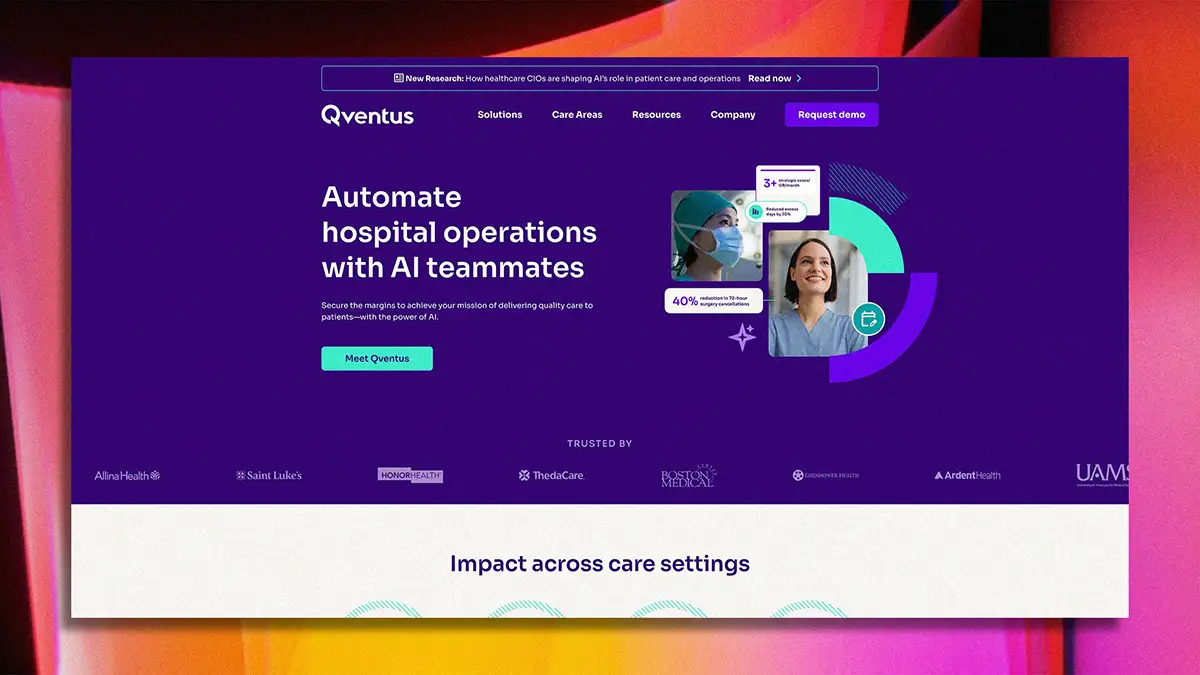
5. Abridge
Abridge transforms clinical operations and healthcare management by using AI to automatically generate medical documentation from patient visits, saving time and increasing compliance.
This solution supports operational excellence in healthcare by reducing provider burnout, improving documentation accuracy, and giving clinicians more time for patient care, making it a valuable partner in healthcare operations.
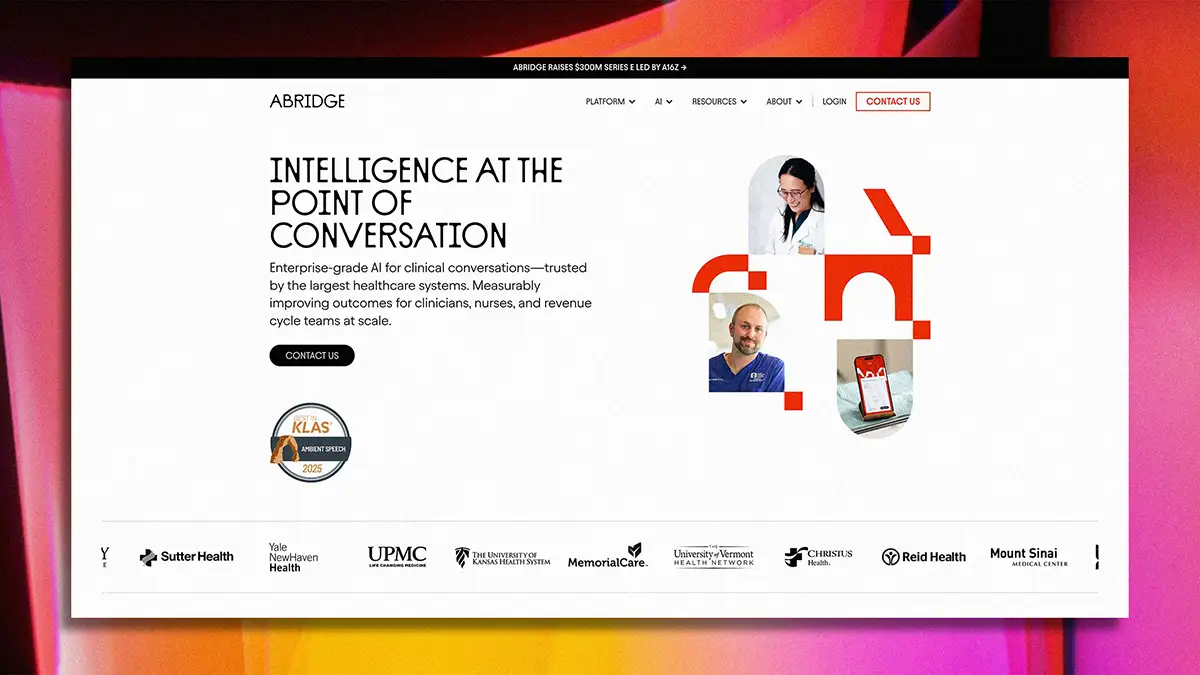
6. CodaMetrix
CodaMetrix enhances healthcare operations management through automated medical coding and prior authorization, helping provider organizations improve operational efficiencies in healthcare revenue cycle management.
Its AI-driven platform supports clinical operations and healthcare management teams in maintaining accuracy, minimizing denials, and reducing administrative workloads.
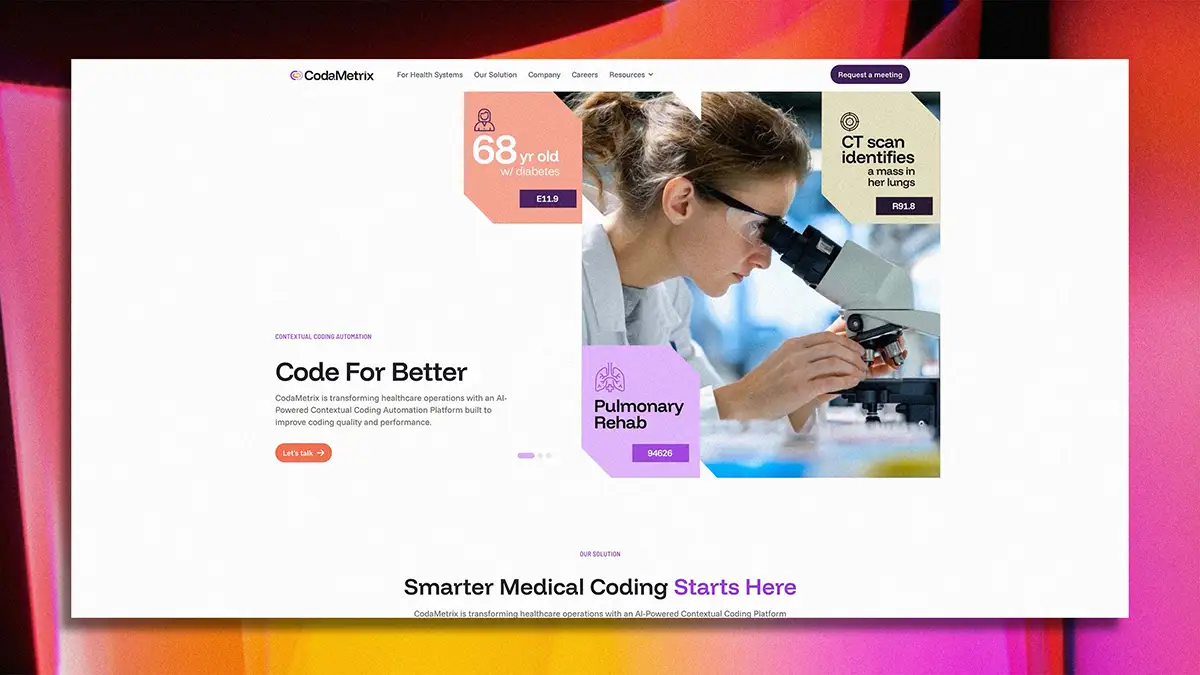
7. Cohere Health
Cohere Health brings AI-powered automation to prior authorization, helping payers and providers improve healthcare operational efficiency and reduce time-to-treatment.
By optimizing operations management in healthcare for both administrative and clinical pathways, Cohere enables a better coordination of care while driving down costs.
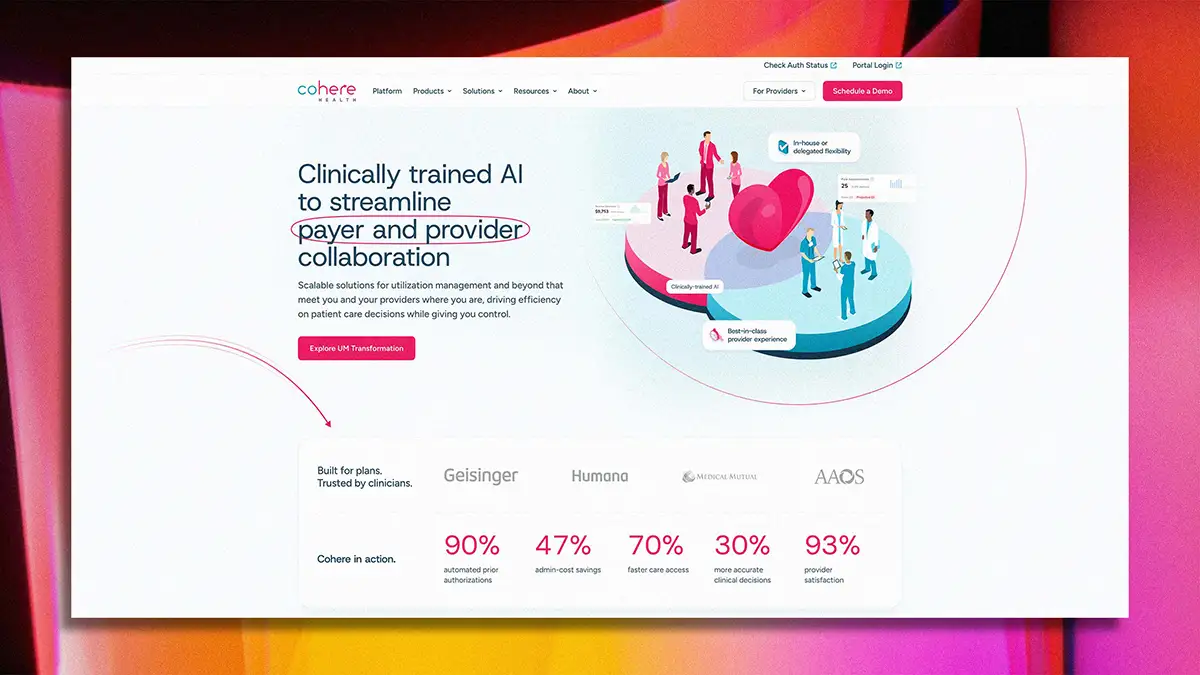
8. Ascertain
Ascertain focuses on operational efficiency in healthcare by deploying AI agents that automate administrative tasks such as note generation and authorization handling.
In collaboration with Northwell Health, Ascertain supports clinical operations and healthcare management by freeing up care teams to focus more on patient care and less on clerical work.
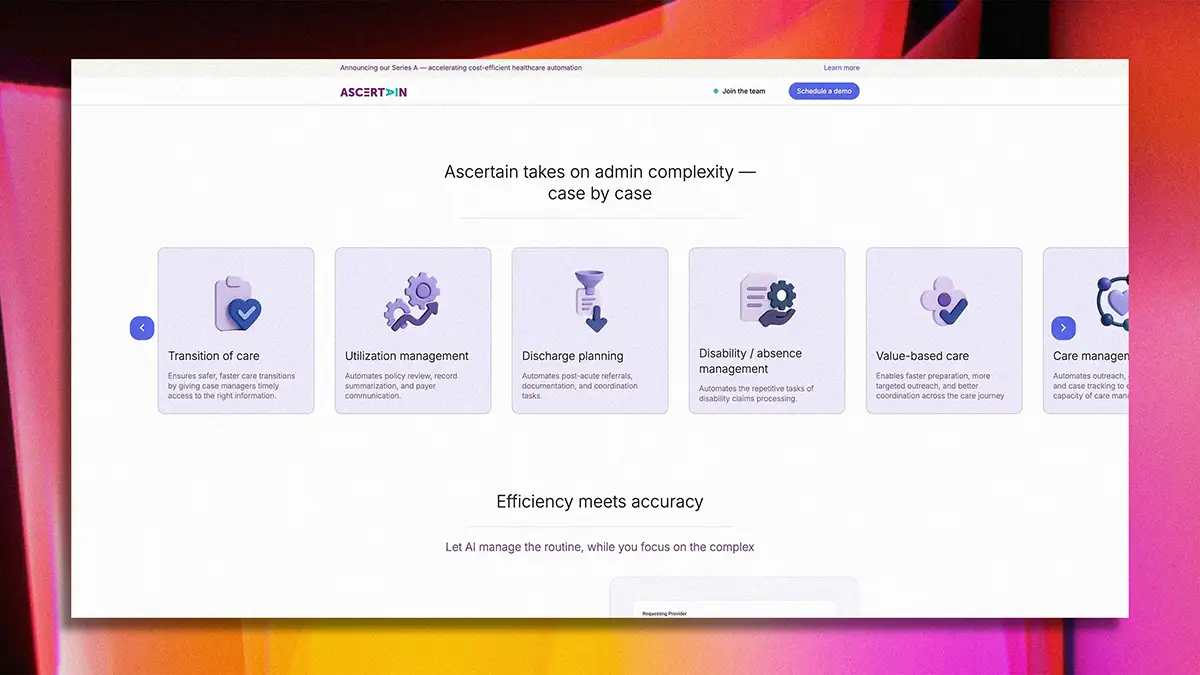
9. Arcadia Analytics
Arcadia integrates data from thousands of healthcare sources to help organizations improve healthcare operations management through population health insights and predictive modeling.
It serves health systems and provider groups seeking to improve operational efficiencies in healthcare by closing care gaps and driving outcomes through data-enabled clinical operations.
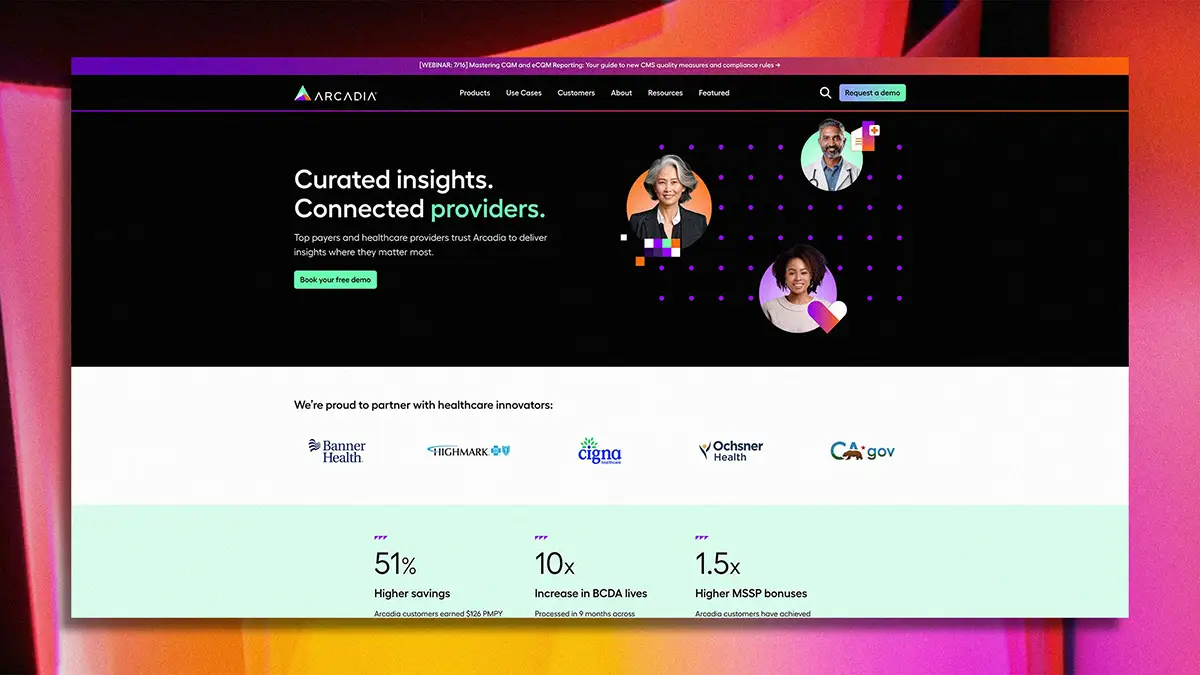
10. Greenway Health
Greenway Health offers EHR, revenue cycle, and chronic care solutions that enhance operations management in healthcare for ambulatory providers nationwide.
Known for its commitment to improving clinical operations and healthcare management, Greenway helps practices streamline workflows and improve patient outcomes through integrated technology.
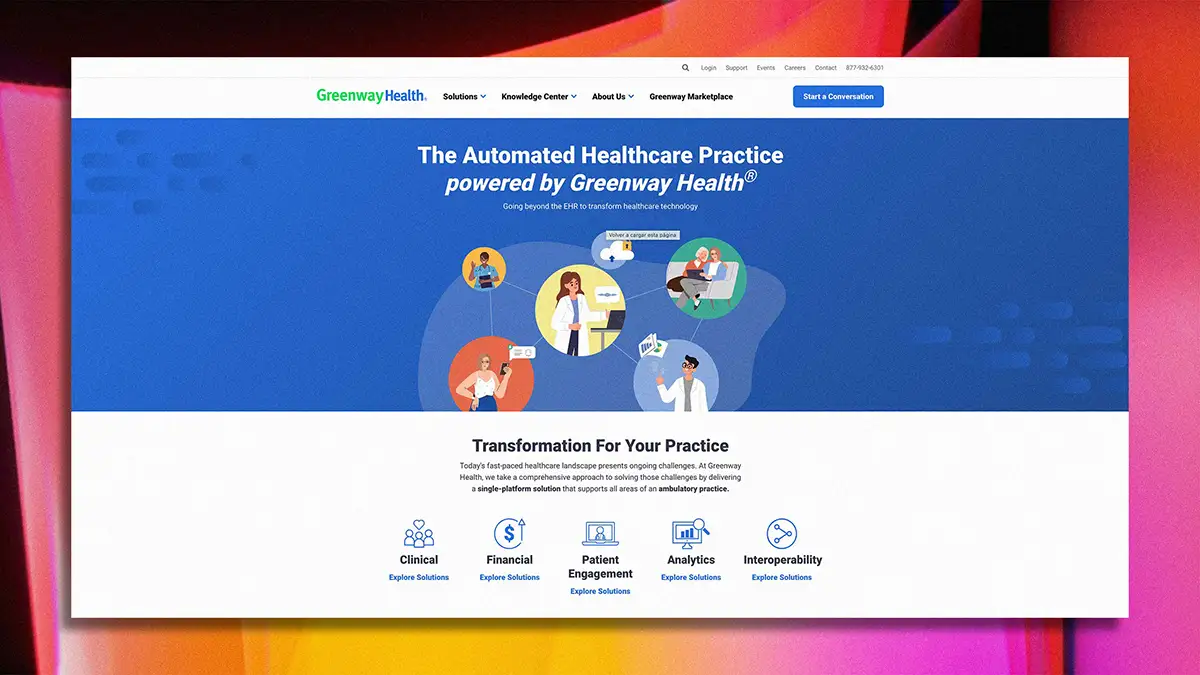
Let’s kickstart the conversation and design stuff people will love.

What Is Healthcare Operations Management?
Healthcare operations management refers to the strategic coordination of resources, systems, and processes that support the delivery of clinical and non-clinical care within healthcare organizations. It encompasses everything from patient flow optimization and workforce planning to supply chain logistics and revenue cycle performance. The goal is to achieve operational excellence in healthcare by aligning administrative efficiency with quality care delivery. Effective healthcare operations management drives improved patient outcomes, reduces costs, minimizes waste, and supports regulatory compliance—all while enabling health systems to adapt to evolving industry demands.
How Does Healthcare Operations Management Work?
Healthcare operations management functions through the integration of data analytics, workflow engineering, digital tools, and evidence-based process redesign to improve operational efficiencies in healthcare. It involves continuous monitoring of key performance indicators across departments, such as bed turnover rates, appointment scheduling, surgical throughput, and claims processing. By leveraging technologies like electronic health records (EHRs), real-time dashboards, and automation, healthcare organizations can identify bottlenecks, allocate resources more effectively, and implement corrective actions that enhance systemwide performance. Ultimately, it enables coordinated decision-making that supports both clinical excellence and financial sustainability.
What Is a Healthcare Operations Management Firm?
A healthcare operations management firm is a specialized consulting and services partner that helps healthcare organizations improve operational performance across clinical, administrative, and technological domains. These firms provide expertise in areas such as process redesign, capacity optimization, workforce planning, digital transformation, and regulatory compliance. They work alongside provider networks, hospitals, payers, and health systems to uncover inefficiencies, design and implement performance improvement strategies, and drive measurable gains in healthcare operational efficiency. By combining industry knowledge with advanced tools and analytics, these firms enable healthcare organizations to enhance care delivery while maintaining cost control and scalability.
Improving clinical operations has become a top priority for healthcare organizations aiming to deliver higher-quality care while controlling costs and meeting regulatory demands. A healthcare operations management firm brings specialized capabilities that directly support this goal—offering the tools, expertise, and strategic insight needed to identify inefficiencies, streamline processes, and drive performance across care delivery systems.
This section outlines the core capabilities that define a leading healthcare operations management firm, illustrating how these organizations enable clinical operations improvement through data-driven optimization, workflow redesign, and targeted interventions that enhance patient flow, reduce variability, and improve outcomes at scale.
What Services Do Healthcare Operations Management Firms Provide?
Clinical Workflow Optimization
Healthcare operations management firms work closely with clinical leaders to analyze and redesign workflows that hinder care delivery and reduce efficiency. Through time-motion studies, capacity modeling, and frontline staff engagement, firms identify inefficiencies in patient intake, discharge processes, medication administration, and more. These improvements help reduce delays, minimize waste, and streamline care pathways—ultimately enhancing both patient experience and operational throughput.
Patient Flow and Throughput Management
A core service of healthcare operations management firms involves optimizing how patients move through the care continuum—from admission to discharge. Using predictive analytics, demand forecasting, and capacity planning, firms help healthcare organizations alleviate bottlenecks, reduce wait times, and improve bed utilization. These strategies are especially critical in emergency departments, surgical services, and inpatient units, where operational efficiency directly impacts quality of care and financial performance.
Capacity Planning and Resource Allocation
Healthcare operations firms support leaders in accurately forecasting demand and aligning staffing, space, and supply resources to match care needs. This includes building scalable models for daily census fluctuations, seasonal trends, and service line volumes. By aligning resources with projected clinical activity, firms help organizations improve cost efficiency and ensure high standards of care even during peak demand periods.
Revenue Cycle Optimization
Revenue cycle services focus on improving the financial performance of healthcare providers by identifying process inefficiencies from patient registration to final reimbursement. Healthcare operations management firms evaluate denial rates, claims processing times, and billing workflows to develop targeted strategies that reduce leakage, improve cash flow, and ensure compliance. These efforts lead to increased financial resilience without compromising clinical care.
Care Coordination and Transitions of Care
Effective care coordination is critical to reducing readmissions, improving outcomes, and enhancing the continuity of care across settings. Healthcare operations management firms offer services to redesign discharge planning, integrate social determinants of health, and improve communication between inpatient and outpatient teams. This results in smoother transitions, reduced duplication of services, and a more patient-centered approach to post-acute care.
Technology and EHR Optimization
Firms help healthcare organizations unlock the full potential of their electronic health records (EHRs) and digital tools by ensuring systems are aligned with clinical and operational goals. This includes optimizing EHR configurations, automating documentation workflows, integrating third-party applications, and training staff. When EHR systems are properly tuned, clinicians spend less time on administrative tasks and more time on direct patient care—improving overall clinical efficiency.
Data Analytics and Performance Reporting
Healthcare operations management firms enable data-driven decision-making by building analytics dashboards, tracking operational KPIs, and establishing enterprise performance frameworks. These services provide executives and managers with actionable insights into cost, quality, and throughput metrics—allowing for continuous improvement and proactive management of system performance. Advanced analytics also uncover hidden inefficiencies that traditional methods often overlook.
Regulatory and Compliance Support
In an increasingly complex regulatory environment, healthcare operations management firms help clients navigate compliance requirements across Medicare, Medicaid, and private payers. Services include auditing processes, updating policies, and training staff to meet evolving standards. Ensuring compliance not only reduces risk but also supports operational excellence in healthcare by aligning operations with best practices and national benchmarks.
Workforce Optimization
Optimizing the healthcare workforce involves more than staffing ratios—it requires aligning the right skills, at the right time, in the right setting. Healthcare operations firms assess labor productivity, shift patterns, and role design to improve both efficiency and staff satisfaction. By reducing overstaffing, preventing burnout, and improving team-based care models, organizations can achieve stronger clinical and operational performance.
Strategic Cost Reduction
Rather than relying on across-the-board cuts, healthcare operations management firms apply strategic cost containment methods that preserve quality while improving margin. This includes redesigning supply chain logistics, consolidating service lines, and optimizing vendor contracts. Through rigorous benchmarking and root-cause analysis, firms identify sustainable savings opportunities without undermining care delivery or clinical outcomes.

Partnering with a healthcare operations management firm offers organizations access to specialized expertise and proven methodologies that are often unavailable internally. These firms bring a fresh perspective and deep industry knowledge to help identify hidden inefficiencies, implement best practices, and drive measurable improvements in clinical and operational performance.
This section explores the key reasons why healthcare providers and systems choose to work with operations management firms—from expanding bandwidth and accelerating change to leveraging data-driven insights and reducing costs—highlighting the value these partnerships deliver in advancing healthcare operational excellence.
Access to Specialized Expertise
Healthcare operations management firms bring deep industry knowledge and technical skills that many organizations lack internally. Their specialized expertise in clinical operations improvement, process redesign, and healthcare operational efficiency enables clients to tackle complex challenges with precision and confidence, accelerating improvements that would be difficult to achieve alone.
Enhanced Bandwidth and Capacity
Healthcare organizations often face internal resource constraints, limiting their ability to execute large-scale operational improvements. Partnering with a healthcare operations management firm supplements internal teams, providing additional bandwidth and focused project management capacity to drive initiatives forward without overburdening existing staff.
Data-Driven Decision Making
These firms leverage advanced analytics, benchmarking, and performance tracking to provide actionable insights into healthcare operational performance. By using data to identify inefficiencies and monitor progress, healthcare operations management firms empower clients to make informed decisions that support continuous improvement and measurable outcomes.
Cost Efficiency and Financial Impact
Healthcare operations management firms help identify cost-saving opportunities through process optimization, resource allocation, and technology integration. Their expertise supports reducing waste, minimizing errors, and improving revenue cycle management, ultimately enhancing the financial health of healthcare organizations while maintaining or improving quality.
Accelerated Change Management
Successfully implementing operational improvements requires effective change management strategies. Healthcare operations management firms bring structured methodologies and experience to help organizations navigate resistance, engage stakeholders, and ensure adoption, accelerating transformation timelines and sustaining long-term gains.
Access to Best Practices and Innovation
Working with a healthcare operations management firm gives organizations exposure to industry best practices and innovative approaches developed through experience across multiple clients and healthcare settings. This access helps clients stay ahead of evolving trends and regulatory requirements, positioning them for continued operational excellence.
Risk Mitigation and Compliance Support
Healthcare operations management firms assist in ensuring that operational changes align with regulatory standards and compliance requirements. Their guidance helps mitigate risks associated with audits, reimbursement, and patient safety, safeguarding organizations while improving operational processes.
How to Choose The Most Reliable Healthcare Operations Management Firm
Choosing the right healthcare operations management firm is a critical decision that can significantly influence the success of clinical operations improvement initiatives. With a wide range of firms offering diverse capabilities, healthcare organizations must carefully evaluate partners based on expertise, cultural fit, and proven results.
This section outlines key considerations for selecting a healthcare operations management firm, helping healthcare leaders make informed choices that align with their strategic goals, operational needs, and desired outcomes. By understanding what to look for, organizations can build effective partnerships that drive lasting improvements in healthcare operational efficiency.
Relevant Industry Experience
When selecting a healthcare operations management firm, it is essential to prioritize firms with demonstrated experience in the specific clinical areas and operational challenges relevant to your organization. Firms familiar with your care settings—whether hospitals, ambulatory centers, or specialty practices—bring tailored insights and proven methodologies that can accelerate improvement efforts and reduce implementation risks.
Proven Track Record of Results
A firm’s ability to deliver measurable improvements in operational efficiency and clinical outcomes should be a key consideration. Look for partners who can provide case studies, client references, and quantifiable evidence of success in healthcare operational improvement. This transparency signals both capability and accountability.
Collaborative and Flexible Approach
Effective healthcare operations management requires strong collaboration across clinical, administrative, and leadership teams. Choose a firm that demonstrates flexibility and a partnership mindset, adapting their strategies to your organization’s culture, priorities, and resource availability rather than applying one-size-fits-all solutions.
Data and Technology Expertise
Given the central role of data analytics and digital tools in modern healthcare operations, firms should have robust capabilities in leveraging technology to identify inefficiencies, monitor performance, and automate workflows. Ensure the firm can integrate seamlessly with your existing systems and advance your data-driven operational goals.
Change Management Capability
Operational improvements often require shifts in behaviors and processes that can meet resistance. Selecting a healthcare operations management firm with proven change management expertise ensures they can guide your organization through transitions effectively, promoting adoption and sustainability of new practices.
Financial Transparency and Value
Pricing models and fee structures should be clear and aligned with the scope of work and expected outcomes. Look for firms that demonstrate a focus on delivering value—balancing cost considerations with the potential financial and operational benefits their services provide.
Alignment with Strategic Goals
The right partner will understand your organization’s broader strategic objectives and tailor clinical operations improvement efforts to support those goals. This alignment ensures that operational changes contribute not only to efficiency gains but also to quality enhancement, patient satisfaction, and long-term sustainability.
15 Questions To Ask Healthcare Operations Management Firm Before You Hire One

Before engaging a healthcare operations management firm, decision-makers often have important questions to ensure the partnership will meet their specific needs and deliver expected results. Understanding what to ask helps clarify capabilities, approach, and fit, reducing risks and aligning expectations from the outset.
This section highlights common questions prospective clients should consider when evaluating healthcare operations management firms. By addressing these inquiries, organizations can make more informed decisions and select partners best suited to drive meaningful clinical operations improvement.
Here are 15 questions a prospective client might ask before hiring a healthcare operations management firm:
- What experience do you have with clinical operations improvement in organizations similar to ours?
- Can you provide examples of measurable results you have achieved for other healthcare clients?
- How do you tailor your approach to fit the unique needs and culture of our organization?
- What methodologies and tools do you use to identify inefficiencies and areas for improvement?
- How do you ensure alignment between clinical staff, leadership, and operational teams during an engagement?
- What is your process for managing change and securing stakeholder buy-in?
- How do you integrate with existing technology systems, such as EHRs and analytics platforms?
- What kind of ongoing support or performance monitoring do you offer after implementation?
- How do you handle data privacy and compliance with healthcare regulations?
- What is the typical timeline for an engagement of our size and complexity?
- How do you structure your pricing, and what factors can influence the overall cost?
- Can you provide references from healthcare organizations similar to ours?
- What distinguishes your firm from other healthcare operations management consultants?
- How do you measure success and report progress throughout the project?
- What happens if the agreed-upon goals are not met within the expected timeframe?
What Experience Do You Have With Clinical Operations Improvement in Organizations Similar to Ours?
Understanding a firm’s experience with organizations similar to yours is critical because healthcare operations vary widely by size, setting, and patient population. A firm familiar with your specific clinical environment—whether it’s a large health system, ambulatory network, or specialty practice—will better grasp your unique challenges and regulatory landscape. This experience increases the likelihood they can deliver tailored, effective improvements without a steep learning curve.
Can You Provide Examples of Measurable Results You Have Achieved for Other Healthcare Clients?
Asking for concrete examples of past success helps ensure the firm’s claims are backed by evidence. Measurable results—such as reduced patient wait times, improved throughput, or enhanced revenue cycle performance—demonstrate the firm’s ability to translate strategies into tangible benefits. This transparency also gives you confidence that the engagement can achieve meaningful operational improvements rather than theoretical recommendations.
How Do You Tailor Your Approach to Fit the Unique Needs and Culture of Our Organization?
Healthcare organizations have distinct cultures, workflows, and stakeholder dynamics that influence how changes are received and implemented. A firm’s willingness and ability to customize its methodology to your environment is essential for smooth collaboration and sustainable results. Understanding their approach to cultural alignment signals their flexibility and commitment to partnership rather than imposing one-size-fits-all solutions.
What Methodologies and Tools Do You Use to Identify Inefficiencies and Areas for Improvement?
The rigor and sophistication of the firm’s diagnostic tools reflect their capacity to uncover root causes rather than just symptoms. Whether using time-motion studies, process mapping, advanced analytics, or benchmarking, knowing their approach helps you assess if they can deliver thorough and data-driven assessments that lead to targeted, high-impact interventions.
How Do You Ensure Alignment Between Clinical Staff, Leadership, and Operational Teams During an Engagement?
Operational improvement requires coordinated effort across multiple stakeholders. Firms that proactively facilitate communication and alignment help prevent silos and resistance. Asking about alignment processes reveals how the firm manages collaboration, fosters shared goals, and maintains momentum throughout the engagement—key factors in achieving lasting clinical operations improvement.
What Is Your Process for Managing Change and Securing Stakeholder Buy-In?
Change management is often the most challenging aspect of operational transformation. Understanding a firm’s approach to managing resistance, engaging frontline staff, and sustaining behavioral change is critical to ensuring new processes are adopted and embedded. This question helps uncover whether the firm provides structured change management expertise or merely technical recommendations.
How Do You Integrate With Existing Technology Systems, Such as EHRs and Analytics Platforms?
Given the central role of technology in healthcare operations, the ability to work seamlessly with your current IT infrastructure is vital. This includes data access, system interoperability, and workflow automation. By clarifying integration capabilities, you can avoid costly disruptions and ensure that any new tools or insights complement rather than complicate your existing systems.
What Kind of Ongoing Support or Performance Monitoring Do You Offer After Implementation?
Operational improvements require continuous oversight to maintain gains and adapt to evolving challenges. Firms offering ongoing support and monitoring demonstrate commitment to long-term success rather than one-off projects. This question helps identify partners who provide sustained value through performance dashboards, periodic reviews, and iterative optimization.
How Do You Handle Data Privacy and Compliance With Healthcare Regulations?
Healthcare data is highly sensitive and subject to strict regulations such as HIPAA. Ensuring the firm adheres to all relevant privacy and security standards protects your organization from legal risks and reputational damage. Asking this question signals the importance you place on compliance and helps assess the firm’s professionalism and risk management capabilities.
What Is the Typical Timeline for an Engagement of Our Size and Complexity?
Setting realistic expectations about how long the project will take enables better internal planning and resource allocation. Timelines vary based on project scope, organizational readiness, and technology requirements. This question helps clarify key milestones and phases, reducing surprises and helping your leadership team stay informed throughout the process.
How Do You Structure Your Pricing, and What Factors Can Influence the Overall Cost?
Understanding pricing models—whether fixed fee, time and materials, or value-based—allows you to align budgets with project goals. Additionally, knowing which variables (such as scope changes, technology integration, or additional training) may affect costs ensures transparency and helps prevent budget overruns. This question fosters open financial discussions upfront.
Can You Provide References From Healthcare Organizations Similar to Ours?
References offer direct insights into the firm’s working style, reliability, and effectiveness from clients who have faced comparable challenges. Speaking with peers helps validate claims and identify potential red flags. It also gives you a clearer picture of what day-to-day collaboration might look like, aiding confidence in your selection.
What Distinguishes Your Firm From Other Healthcare Operations Management Consultants?
This question encourages the firm to articulate its unique value proposition, whether through proprietary methodologies, specialized expertise, or a particular approach to partnership. Understanding their differentiators helps you assess fit beyond capabilities—such as cultural alignment, innovation, or client service philosophy—which can be critical to success.
How Do You Measure Success and Report Progress Throughout the Project?
Clear metrics and transparent reporting are essential for tracking operational improvements and ensuring accountability. This question helps you understand how the firm defines and measures success, what key performance indicators they prioritize, and how frequently you will receive updates. Effective measurement practices enable course corrections and reinforce confidence in outcomes.
What Happens If the Agreed-Upon Goals Are Not Met Within the Expected Timeframe?
Discussing contingencies upfront clarifies how the firm manages risk and accountability. Knowing whether they offer remediation plans, adjusted scopes, or performance guarantees helps set expectations and reduces uncertainty. This question also reveals the firm’s commitment to delivering results and maintaining a collaborative relationship if challenges arise.
Searching For The Right Healthcare Operations Management Firm?
Hiring a healthcare operations management firm offers organizations specialized expertise, proven methodologies, and additional capacity to address complex clinical and operational challenges. These firms bring a data-driven approach that uncovers inefficiencies, streamlines workflows, and supports sustainable improvements in healthcare operational efficiency. By partnering with a trusted firm, healthcare providers can accelerate change, reduce costs, enhance patient outcomes, and navigate the complexities of regulatory compliance—benefits that are increasingly critical in today’s evolving healthcare landscape.
G & Co. stands out as a strategic partner for healthcare organizations seeking meaningful clinical operations improvement. With deep industry expertise and a collaborative approach, G & Co. combines rigorous data analysis with customized process redesign to drive measurable gains in healthcare operational efficiency. Clients benefit from G & Co.’s ability to integrate seamlessly with existing systems, foster stakeholder alignment, and implement sustainable change—qualities that position it among the best healthcare operations management firms focused on delivering lasting impact.
Submit an inquiry to G & Co. on our contact page or click on the blue "Click to Contact Us" button on the bottom right corner of your screen for your convenience. We look forward to hearing from you.






%20(1).png)




